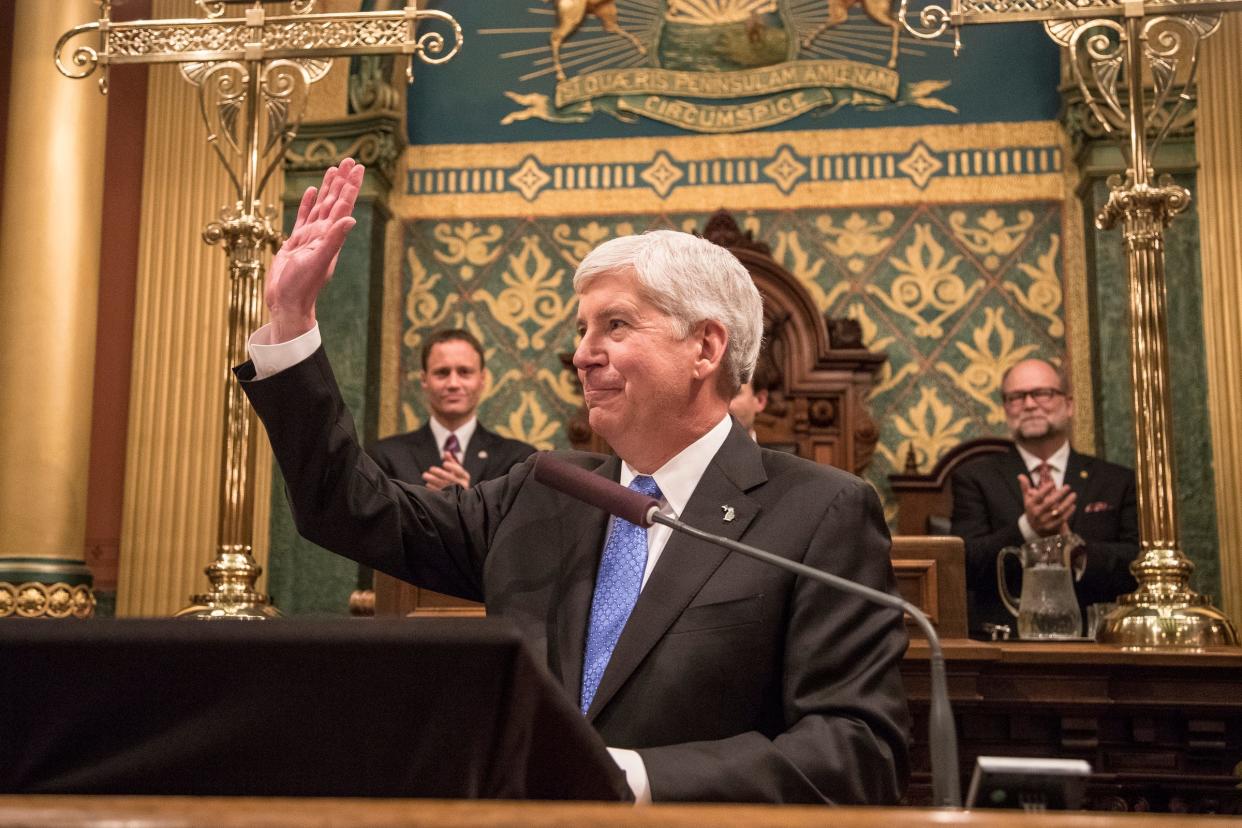Rick Snyder took power from Michigan cities. This Legislature must restore it. | Opinion
In 2015, Gov. Rick Snyder and the Michigan Legislature apparently weren’t content with just running the state, because they took a crack at managing our local governments, too.
Not because local governments weren’t doing a good job. This wasn’t about making local governments better. This was about making them weaker.
This strategy of consolidating power at the state level, by eroding our rights at the local level, is called “state preemption.” Big businesses like it because it’s easier for corporate lobbyists to pull the strings of one state government than a thousand city governments.
State preemption sounds like a courtesy. Like, “Ope, we’re the state. We’re going to preempt you. No need to fuss.” But it’s not. It’s a power grab, and it’s a playbook engineered by huge corporations to make it easier for them to impose their will unilaterally.
Fortunately, the Michigan Legislature, under new leadership, has introduced bills in both the House and the Senate, Senate Bills 170 and 171, that would restore the local government rights that were taken away in 2015, when Michigan passed state preemption through Public Act 105 of 2015.
What else is happening in Lansing? Michigan lawmakers are supposed to protect us, but they're letting a hate crime bill wither away
Michigan’s 2015 preemption law was sweeping. It took away local governments’ ability to pass ordinances that would benefit workers — from raising the minimum wage to requiring paid sick leave or even negotiating community benefit agreements (when a big developer agrees to do specific things for a community in exchange for tax breaks) at the local level. But it also took away local government’s ability to pass ordinances that would benefit local businesses — like establishing local hiring goals or apprenticeship standards.

Why not follow in the path of Big Tobacco?
Big businesses lobby for state preemption laws because corporate domination is really hard when you have to have a state and a local strategy.
That’s what Big Tobacco realized when it developed the playbook for state preemption back in the 1980s.
Back then, local governments around the country were passing ordinances that changed where you could smoke, and who could buy cigarettes. Without any sense of irony, a retired tobacco lobbyist once described these local ordinances as “fires” Big Tobacco kept having to put out.
Annoyed by the second-hand smoke of local democracy, Big Tobacco worked to pass state preemption laws forbidding local governments from passing clean air ordinances or local age restrictions on buying cigarettes.
Knowing it wasn’t a credible mouthpiece, Big Tobacco wasn’t the spokesperson. Instead, the industry used front groups like restaurant associations, chambers of commerce or retailers to promote this agenda.
And they weren’t coming out against clean air ordinances or age restrictions on cigarettes. People like those things. No, Big Tobacco and its allies called this a fight against the “anti-business environment” and a “patchwork of confusing regulations.”
In 2015, the strategy to implement state preemption used the exact same playbook in Michigan and many other states around the country. In fact, they didn’t even change the front groups or the talking points. The fight was led publicly by none other than restaurant associations, chambers of commerce and retailers. Scott DeFife, then head of government affairs for the National Restaurant Association, told the New York Times: “Businesses are operating in an already challenging regulatory environment. The state legislature is the best place to determine wage and hour law. This is not the kind of policy that should be determined jurisdiction by jurisdiction.”
Anti-business environment and patchwork of confusing regulations. Why change a winning strategy, right?
Back to the future ... of snatching local governance
Fast forward to 2023, and not a single thing about this strategy has changed. In fact, you can read about those business groups’ concerns in the letter they signed and sent to the state Legislature back in June.You see, those business leaders aren’t against local governments. They aren’t against good wages or paid leave, just like Big Tobacco wasn’t against clean air. They are just trying to create a pro-business environment by lessening the burden on job creators.
Oh, the burden. Thoughts and prayers for the extraordinary hardship of corporate wealth.
With different wage ordinances in different places, businesses have to figure out a way to pay people different amounts. It’s too complicated, and that’s why successful businesses pay everyone the same amount! Wait. No, that doesn’t seem right. It seems like businesses have figured out that some people make more money than other people. I believe they call those payroll departments.

That’s why states with preemption laws have such great economies? No, that’s not true either. In fact, many of the states with the strongest preemption laws have the worst economies. (I’m looking at you, Mississippi. Mississippi’s state preemption law is so severe that a public official who violates it can be personally fined up to $1,000. Mississippi — where it’s a crime to raise wages.)
At the end of the day, state preemption is a power grab, and it weakens the influence that local residents and local businesses have by giving up our power to big corporations who can operate more easily through our state government.
If you like what your state government is doing, it won’t hurt you to have power at the local level, too. And if you don’t like what your state government is doing, then you definitely want more power at the local level.
Either way, unless you are operating behind your own high-priced lobbying firm, local democracy is good for you and Michigan’s state preemption law is bad for democracy.
Jen McKernan is the communications director for the United Brotherhood of Carpenters and Joiners of America.Submit a letter to the editor at freep.com/letters.
This article originally appeared on Detroit Free Press: Michigan Legislature, repeal Rick Snyder 2015 local preemption laws
